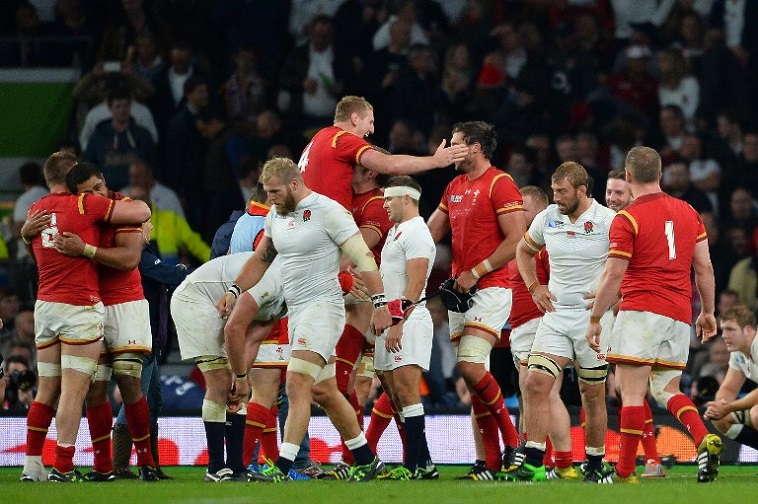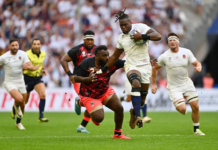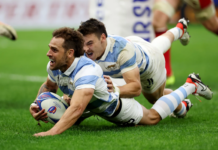On Channel Eye with my good mate Jayan Goonetillake, I put him on the customary spot just before we handed over to the international commentators.
“England, by ten” he said, confidently. Most punters said the same. Manjula, our Sinhala anchor tossed the question my way and I said “Wales by three”. Off air Jayan told me that if I was a professional gambler I’d be a pauper. I disagreed, saying that when I win, I win big.
And the wins don’t come much Biggar than this.
Why did I think England would come unstuck? Several reasons. Spending a couple of weeks in London during the buildup, I had been privy to a lot of the warm up games and the media speculation surrounding it. That was when it became pretty obvious that Stuart Lancaster and his England set up, didn’t have a clue.
Rugby, is a game won by combinations. Your front row combination, your second row combination, your third row combination, halves combination, midfield pairing and back three cohesion. In the modern game dominated by defense the third row combination and midfield combination are the most important. If your halves are good and your back three are good, you can also score points. So as a coach, and a strategist it’s about getting those combinations right. You can plonk your biggest players in their and smash the opposition line all day, as Lancaster planned to do through Barritt and Burgess. Let’s not forget that before this tournament Barritt had not played any rugby for close to 6 months. Suddenly he’s asked to do a job as the defensive lynchpin and with one rusty game under his belt, he’s asked to ‘move over please’ to accommodate a greenhorn.
While no. 12 is the one who has to take most crashballs and will definitely get pounded, no. 13 is the defensive position that requires a little more nous. The ability to hold the defensive line, pick out dummy runners and make last minute half steps to the left or right, is crucial. We saw how it didn’t work for Goaramaru’s brilliant first phased try against South Africa. Similarly, we saw the lack of discipline leading to Gareth Davies heart breaking (if you’re English) score at Twickenham.
Lancaster’s need to revert to form when attacking rugby had won them games, showed a sign of insecurity. A lack of confidence with his own thinking and training. For a time, especially in their win over the All Blacks, England with the trio of Watson, May and Brown had looked like they would terrorise some defenses. On Saturday, with two battering rams in midfield, they deferred too much to the Welsh second string. In fact, Gatland – whilst also reveling in teasing England with such a close win – must also have had a word with his backline about not getting wide earlier. They tried, but not often enough, with conviction.
As it happened, Burgess had been putting in a shift at inside centre. Doing very little with ball in hand but effectively snuffing out the threat of Jamie Roberts. With Ford coming on for Burgess, in an interesting move (interesting, because it cannot be understood) Barritt was suddenly, not only playing his second match in a long time, but also out of position and suddenly having to adjust to Farrell as a defensive sidekick. For Davies’ try, with Burgess rushing up all day, Barritt did the same. But Farrell who had been playing fly half all game, went across, creating the stagger that allowed Jamie Roberts to get the other Williams into space for the tantalising kick to Gareth Davies.
The game started going south (or West, really) for England when Youngs went off. The scrum half was one of England’s most dangerous line breakers in this game, and Wigglesworth could not provide the same threat from the base. It freed up Warburton and Faletau to be more aggressive at the break down and England’s glut of penalties were indicative of a breakdown in fluency. The inexplicable substitution of the hard working (if little else) Burgess for another fly half compounded the defensive indecision. This match was lost in the coach’s box. Make no mistake about it.
Chris Robshaw’s decision to go for the corner was a brave one. Farrell would have shaken his head when the captain’s eyes met his, and the English line out was dominant all game. However, after making the correct decision, the England captain’s brain exploded in calling it to himself at no. 2. I hadn’t seen a drive constructed from no. 2 from England for a long time. Perhaps not since the days of Martin Johnson. Robshaw caught the ball, but didn’t make it available for an unwilling second wave, and it was the easiest job Wales had all night to drive him into touch. Launchbury or Parling would have been the better targets, why he didn’t call on them, only the skipper will know.
Once again, that decision showed a complete lack of tactical awareness by the England set up. It was basic stuff. Really basic stuff a southern hemisphere u 19 player will know. Sometimes you can sense this in a camp. England had been going overboard in talking up their players, and their chances in this World Cup while ignoring the obvious frailties in this team selection.
The sad part – if you’re an England fan – is that Luther Burrell, Kyle Eastmond and Henry Slade sit twiddling their thumbs, watching the petals fall off the English rose. Those lads would have cut open this Welsh line which ended up fielding two fly halves, two wingers, two scrum halves and a centre towards the end of the game. England should actually be thanking themselves George North didn’t see more of the ball. The right winger was threatening every time he was involved in the game. If Wales are to make a semi final – yes, semi final – then North will have to be involved more than just peripharally, and Liam Williams will need to recover from Tom Wood’s reckless shin through the head.
The English may improve if they kick themselves up the backside instead.

















